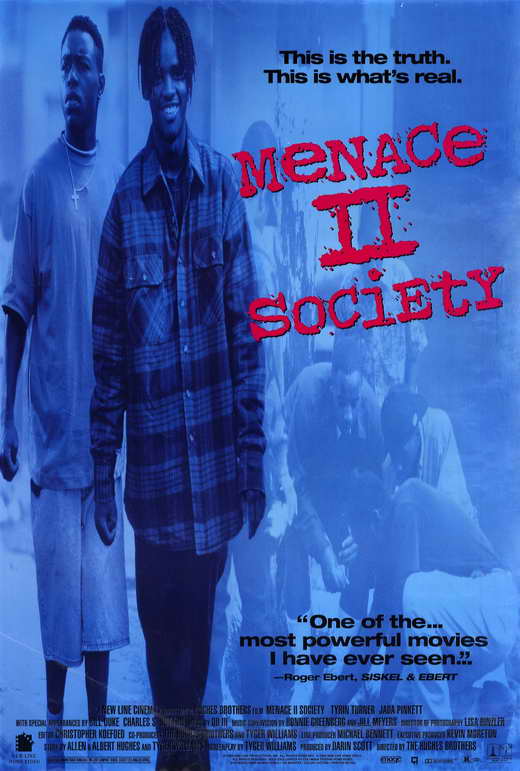
My top pick this week is a film that introduced a pair of new talents back in 1993 - "Menace II Society". Directed by Albert and Allen Hughes, it is certainly one of the most remarkable debuts in the past few decades. This cautionary tale boldly illustrates the dangerous lives of a group of young black men living in the ghetto.
The protagonist of this story is a young man named Caine (Tyrin Turner). Fresh out of high school, he decides to follow the usual path of his peers - selling drugs and hustling to survive. This is indeed another story about the urban struggle (as discussed previously in "Fresh"), but the way that the Hughes brothers approach the material distinguishes itself from other black films.
On watching the "Menace II Society", there are fascinating comparisons to be made with the topical black films of the moment ("12 Years A Slave", "The Butler", "Fruitvale Station"). Those popular 2013 releases all put forth the common sentiment of victimization by an unfair, predominantly white society. It's an understandable concern, but perhaps it doesn't give you the full picture (many have already criticized the depiction of the police in "Fruitvale Station"). As a result, the alternate approach of "Menace II Society" feels truly incendiary. Rather than placing the blame on the white man, the directors chose to illuminate the destructive behaviour of young thugs in South Central Los Angeles. In doing so, they make a fervent plea for a change in attitudes and the resulting film truly jolted me.
From the first scene, it's clear that the duo will pull no punches. Best friends Caine and O-Dog (Larenz Tate) enter a corner store to buy liquor, only to engage in an argument with the shopkeepers. Out of nowhere, a trivial comment about O-Dog's mom ends in tragedy. He empties several rounds of bullets into the man and his wife. This incident hangs over the rest of the movie, showing a troubling disregard for human life that is common throughout most of the film's characters. Though Caine is remorseful, O-Dog is proud of his actions, happily screening the surveillance tape for his friends at repeated times in the film. Clearly, there are serious endemic psychological issues within such a society.
As shocking as that opening sequence is though, it's just one of many such instances of sickening violence. Yet rather than feeling too exploitative and extreme, the script manages to include some unexpected glimpses of humanity. It would have been easy to just portray the unending cycle of violence, but inclusion of several voices of reason greatly assists in putting forth the film's message. Caine's grandparents, his friend Ronnie and a wise father figure try to guide him on the right path. He's offered a way out, but will he take it?
The buildup to resolving that question takes Caine through many obstacles. Indeed, every negative stereotype of black culture seems to be touched upon, almost to the point of parody. Admittedly, it holds back the film from realizing its full artistic potential. Still, the social commentary is so rigorous and staggering that it's hard to ignore the film's value. Much like a documentary, this is a case where the subject of the film is the most important concern. That the film also has such an impressive directorial vision (the camera work is particularly impressive) is just the icing on the cake. In the history of black cinema, "Menace II Society" is undoubtedly one of the most essential works.
This film is part of my Black Cinema marathon.
| Tweet |






No comments:
Post a Comment